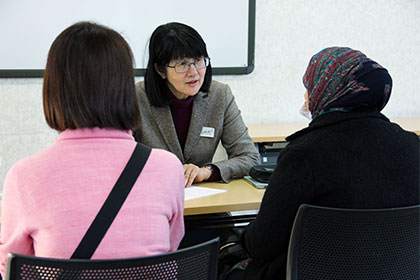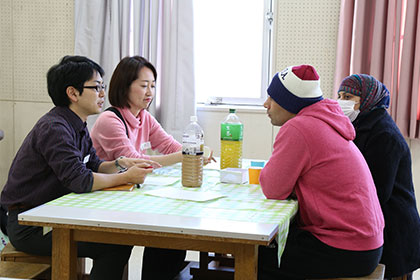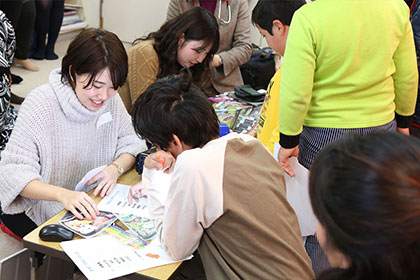Overcoming language and cultural barriers in public healthcare: Juntendo University students participate in community health promotion program for families in Japan whose first language is not Japanese.
Five students from Juntendo University Faculty of Medicine and one from the Faculty of International Liberal Arts studying to be a medical translator participated in a community health promotion program for families living in Japan with members whose first language is not Japanese.
The aim of this program was to give medical doctors and medical translators of the future first hand experience of the challenges faced in health care by people living in Japan whose first language is not Japanese.
“This form of international outreach based on medical care is a rare and unusual case to support both parents and their young children,” said Midori Nii of NPO CINGA, who coordinated the event.
Furthermore, Naoko Ono, lecturer in intercultural communication in medical communication at the Faculty of International Liberal Arts, Juntendo University, also participated in the event and joined the students to interview families who had applied for health consultation as well as attending the health consultation sessions by Professor Yuko Takeda.
Japanese was not the mother tongue of the majority of members of the participating families, they requested health consultations using ‘easy to understand Japanese’. Through the interviews, the students realized that level of understanding and response of the participants depends on the manner of questioning.
Professor Takeda observed that: "The language barrier prevents people from accessing appropriate health care, and could easily affect their health status.” She added that, “this outreach program is very effective in providing students with the opportunity to become aware of how important it is to recognize the wide range of psychosocial backgrounds of people who might be their patients one day. The role of doctors is not only diagnosing medical conditions for proper treatment but also becoming an advocate for their patients and the communities they serve."
Hinano Tsuboya, participant and a second year medical student at Juntendo University, said, "I saw people who had health and medical problems as well as lifestyle related issues, due to differences in culture and language barriers; I realized that training to become a doctor is not limited to medical knowledge and technology. When I become a doctor in the future, I would like to be able to conduct medical care based on this experience.”
The families also participated in games designed to teach the importance of good nutrition for a healthy life. The children particularly enjoyed collecting seals during the “stamp rally”.
Reika Masuda, a second year student who was involved in planning the nutrition classes and who is studying to be a medical interpretation at the Faculty of International Liberal Studies said, "It was great to see active participation of the highly motivated children as well; it was worth all the preparation. As I was unable to answer some of the questions for a mother, and as someone studying to be an interpreter I realized that it is important to investigate and acquire sufficient knowledge beforehand in my field of study, and I think that it is important to directly connect to the other people’s world for a deeper understanding about their lives."
This was the first such event even for ‘NPO Machinohiroba’ with the support of a social worker. Kazuko Kaji of NPO Machinohiroba said, "Although we have already conducted interviews with family members in our daily activities, on this occasion we were able to identify children's psychological challenges and health issues because we worked together with experts in medical and social care. In the future, we would like to continue carrying out our activities in collaboration with these specialists.”
Further information
A television program—NHK World Inside Lens: “Suturing Cultures”—about the approach of Juntendo University Faculty of Medicine to international education is available at the NHK World website below. As an integral part of English language education, students at the Juntendo University the Faculty of Medicine take courses in conducting medical interviews with patients whose mother language is not Japanese for deeper cross-cultural understanding, as is appropriate for medical practitioners.
NHK World
Inside Lens: “Suturing Cultures”, directed by Ian Thomas Ash
https://www3.nhk.or.jp/nhkworld/en/tv/lens/320_28.html ![]()
Details about the event
Date: 4th February 2017
Place: Miyoshi Town, Fujikubo Community Center
Participants
- Juntendo University: Professor Yuko Takeda, Department of Medical Education at the Faculty of Medicine; Naoko Ono, lecturer in intercultural communication in medical communication at the Faculty of International Liberal Arts; five students from the Juntendo University Medical School; and one student from Faculty of International Liberal Arts.
- Six staff from NPO ‘Machinohiroba’, Saitama.
- 16 parents and their children living in Miyoshi with connections to Asia and South America.
- Two social workers affiliated with the “multicultural symbiosis social work committee”
Support
- NPO CINGA, Musashino City, Tokyo

Professor Yuko Takeda, Department of Medical Education,
Juntendo University during a medical heath consultation session

Medical student from Juntendo University during medical
consultation (student left, and Naoko Ono 2nd from left)

Children participating in games to learn about nutrition with
a student from Juntendo University.
